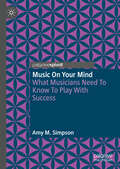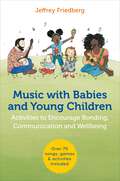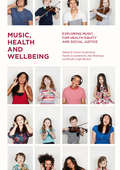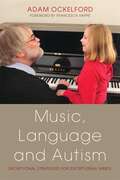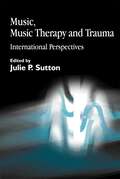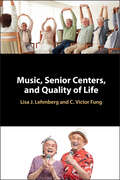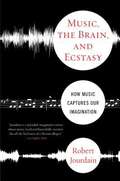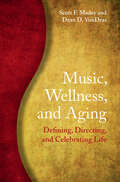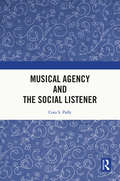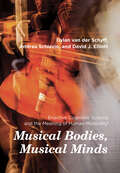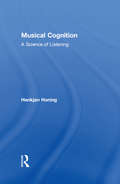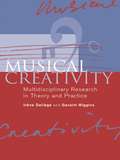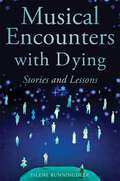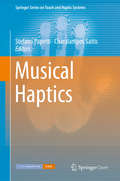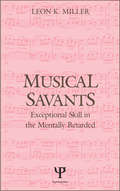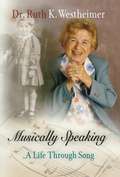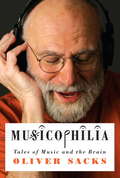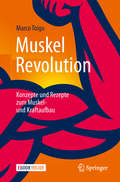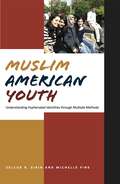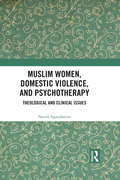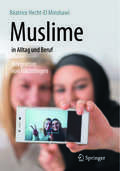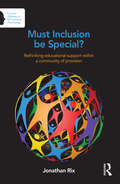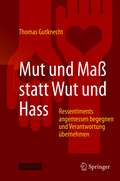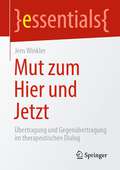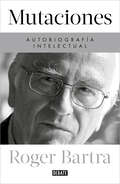- Table View
- List View
Music on Your Mind: What Musicians Need to Know to Play with Success
by Amy M. SimpsonThis book provides musicians, students, and teachers a practical guide for optimal music learning, practice, memorization, and performance by the application of modern neuro-music research. Uncover the best, scientifically researched techniques, supported by researchers and musicians alike, that will empower you to learn thoroughly, practice optimally, and perform at your best. Do you know how people learn? Do you know how people improve motor-skills for playing an instrument? Do you know how to focus attention and stay motivated? Discover the essential answers you need to revitalize and optimize your daily work as a musician. By applying the best methods and knowing why they work, you, too, can create successful practice routines with positive, rewarding, results. Know the best techniques for preparing expert music performance. Learn how to play with success!
Music with Babies and Young Children: Activities to Encourage Bonding, Communication and Wellbeing
by Jeffrey FriedbergFrom day one in a child's life, music is one of the most important things that can be used to help them grow and learn. Musical stimulation helps lay the foundations for a lifetime of skills, and this straightforward guide gives detailed advice on how to use music to help children from 0-5 years with common developmental challenges such as attachment and bonding, bedtime, tantrums and daily living skills, social skills, motor skills and school readiness. Combining cutting-edge research on brain development with proven strategies, this book helps with both typical and atypical issues in the earliest stages of a child's life. Friedberg lays out the musical parenting approach, where any adult can enhance children's lives through music. No prior music skill is necessary to use the musical parenting approach, making it an ideal resource for all parents, teachers and professionals to raise healthy, well-adjusted children in a creative and interactive manner.
Music, Health and Wellbeing
by Brydie-Leigh Bartleet Naomi Sunderland Natalie Lewandowski Dan BendrupsThis book explores the power music has to address health inequalities and the social determinants of health and wellbeing. It examines music participation as a determinant of wellbeing and as a transformative tool to impact on wider social, cultural and environmental conditions. Uniquely, in this volume health and wellbeing outcomes are conceptualised on a continuum, with potential effects identified in relation to individual participants, their communities but also society at large. While arts therapy approaches have a clear place in the text, the emphasis is on music making outside of clinical contexts and the broader roles musicians, music facilitators and educators can play in enhancing wellbeing in a range of settings beyond the therapy room. This innovative edited collection will be of great interest to scholars and practitioners of music, social services, medical humanities, education and the broader health field in the social and medical sciences.
Music, Music Therapy and Trauma: International Perspectives
by Julie Sutton Diane Snow AustinMusic communicates where words fail, and music therapy has been proven to connect with those who were thought to be unreachable, making it an ideal medium for working with those who have suffered psychological trauma. Music, Music Therapy and Trauma addresses the need for an exploration of current thinking on music and trauma. With chapters written by many of today's leading specialists in this area, music and trauma is approached from a wide range of perspectives, with contributions on the following: * neurology of trauma and music; * music and trauma in general; * social and cultural perspectives on trauma; * contextualising contemporary classical music and conflict; * music and trauma in areas where there is war, community unrest and violence (Northern Ireland, Bosnia-Herzegovina, South Africa); * music, trauma and early development. Including specific examples and case studies, this book addresses the growing interest in the effects of trauma and how music therapy can provide a way through this complex process.
Music, Senior Centers, and Quality of Life
by C. Victor Fung Lisa J. LehmbergLisa Lehmberg and Victor Fung present a groundbreaking look at quality of life via the music participation of older adults in diverse US senior centers. The state of musical activities in senior centers pre- and mid-pandemic is elucidated through original research conducted in senior centers across six states. Featured are older adults' stories told in their own words; insights from senior center activity leaders, manage-ment, and staff; and data, analyses, and syntheses from the authors' senior center visits and a survey of center managers. The authors document the adjustment process undergone by these centers during the pandemic and leading into a new normal. Recommendations are offered for policy makers, school and community music educators, music activity leaders, older adults, caregivers, and service providers to enhance the quality of life of older adults. The critical role that music plays in supporting their quality of life is emphasized.
Music, The Brain, And Ecstasy
by Robert JourdainWhat makes a distant oboe's wail beautiful? Why do some kinds of music lift us to ecstasy, but not others? How can music make sense to an ear and brain evolved for detecting the approaching lion or tracking the unsuspecting gazelle? Lyrically interweaving discoveries from science, psychology, music theory, paleontology, and philosophy, Robert Jourdian brilliantly examines why music speaks to us in ways that words cannot, and why we form such powerful connections to it. In clear, understandable language, Jourdian expertly guides the reader through a continuum of musical experience: sound, tone, melody, harmony, rhythm, composition, performance, listening, understanding--and finally to ecstasy. Along the way, a fascinating cast of characters brings Jourdian's narrative to vivid life: "idiots savants" who absorb whole pieces on a single hearing, composers who hallucinate entire compositions, a psychic who claims to take dictation from long-dead composers, and victims of brain damage who can move only when they hear music. Here is a book that will entertain, inform, and stimulate everyone who loves music--and make them think about their favorite song in startling new ways.
Music, Wellness, and Aging: Defining, Directing, and Celebrating Life
by Scott F. Madey Dean D. VonDrasMusic is a metaphor that connects people to a profound sense of life. In this book, music intersects with wellness and aging as humans adapt to life changes, stay engaged, remain creative, and achieve self-actualization. Along with discussion of cutting-edge research, the book presents stories and interviews from everyday people as well as professional and non-professional musicians. It discusses individual and social wellness, age-related and pathological changes in health, music therapies, personal resilience and growth, interpersonal and community relationships, work and retirement, spirituality, and the psychology of aging. The case studies show how music, wellness, and aging connect to define, direct, and celebrate life, as these three concepts allow people to connect with others, break down barriers, and find common ground.
Musical Agency and the Social Listener
by Cora S. PalfyMusic as a narrative drama is an intriguing idea, which has captured explicit music theoretical attention since the nineteenth century. Investigations into narrative characters or personae has evolved into a sub-field—musical agency. In this book, Palfy contends that music has the potential to engage us in social processes and that those processes can be experienced as a social interaction with a musical agent. She explores the overlap between the psychological processes in which we participate in order to understand and engage with people, and those we engage in when we listen to music. Thinking of musical agency as a form of social process is quite different from existing theoretical frameworks for agency. It implies that we come to musical analysis by way of intuition—that our ideas are already partially formed based on our experience of the piece (and what it makes us feel or how it makes us sense it as any other) when we choose to analyze and interpret it. Palfy’s focus on social processes is a very effective way to pinpoint when and why it is that our attention is captured and engaged by musical agents.
Musical Bodies, Musical Minds: Enactive Cognitive Science and the Meaning of Human Musicality
by David J. Elliott Dylan van der Schyff Andrea SchiavioAn enactive account of musicality that proposes new ways of thinking about musical experience, musical development in infancy, music and evolution, and more.Musical Bodies, Musical Minds offers an innovative account of human musicality that draws on recent developments in embodied cognitive science. The authors explore musical cognition as a form of sense-making that unfolds across the embodied, environmentally embedded, and sociomaterially extended dimensions that compose the enactment of human worlds of meaning. This perspective enables new ways of understanding musical experience, the development of musicality in infancy and childhood, music&’s emergence in human evolution, and the nature of musical emotions, empathy, and creativity. Developing their account, the authors link a diverse array of ideas from fields including neuroscience, theoretical biology, psychology, developmental studies, social cognition, and education. Drawing on these insights, they show how dynamic processes of adaptive body-brain-environment interactivity drive musical cognition across a range of contexts, extending it beyond the personal (inner) domain of musical agents and out into the material and social worlds they inhabit and influence. An enactive approach to musicality, they argue, can reveal important aspects of human being and knowing that are often lost or obscured in the modern technologically driven world.
Musical Cognition: A Science of Listening
by Henkjan HoningWhy do people attach importance to the wordless language we call music? Musical Cognition suggests that music is a game. In music, our cognitive functions such as perception, memory, attention, and expectation are challenged; yet, as listeners, we often do not realize that the listener plays an active role in reaching the awareness that makes music so exhilarating, soothing, and inspiring. In reality, the author contends, listening does not happen in the outer world of audible sound, but in the inner world of our minds and brains. Recent research in the areas of psychology and neuro-cognition allows Henkjan Honing to be explicit in a way that many of his predecessors could not. His lucid, evocative writing style guides the reader through what is known about listening to music while avoiding jargon and technical diagrams. With clear examples, the book concentrates on underappreciated musical skills-"sense of rhythm" and "relative pitch"-skills that make people musical creatures. Research on how living creatures respond to music supports the conviction that all humans have a unique, instinctive attraction to music. Everyone is musical. Musical Cognition includes a selection of intriguing examples from recent literature exploring the role that an implicit or explicit knowledge of music plays when one listens to it. The scope of the topics discussed ranges from the ability of newborns to perceive a beat, to the unexpected musical expertise of ordinary listeners. The evidence shows that music is second nature to most human beings-biologically and socially.
Musical Creativity: Multidisciplinary Research in Theory and Practice
by Irène Deliège Geraint A. WigginsThis collection initiates a resolutely interdisciplinary research dynamic specifically concerning musical creativity. Creativity is one of the most challenging issues currently facing scientific psychology and its study has been relatively rare in the cognitive sciences, especially in artificial intelligence. This book will address the need for a coherent and thorough exploration. Musical Creativity: Multidisciplinary Research in Theory and Practice comprises seven sections, each viewing musical creativity from a different scientific vantage point, from the philosophy of computer modelling, through music education, interpretation, neuroscience, and music therapy, to experimental psychology. Each section contains discussions by eminent international specialists of the issues raised, and the book concludes with a postlude discussing how we can understand creativity in the work of eminent composer, Jonathan Harvey. This unique volume presents an up-to-date snapshot of the scientific study of musical creativity, in conjunction with ESCOM (the European Society for the Cognitive Sciences of Music). Describing many of the different aspects of musical creativity and their study, it will form a useful springboard for further such study in future years, and will be of interest to academics and practitioners in music, psychology, cognitive science, artificial intelligence, neuroscience and other fields concerning the study of human cognition in this most human of behaviours.
Musical Encounters with Dying: Stories and Lessons
by Diana Peirce Islene RunningdeerMusic therapy can be a profound physical, emotional and spiritual support at the end of life. This book looks at a wide variety of cases, explaining how music therapy can be used effectively. It highlights particular components of working with this group, such as creating a therapeutic relationship, helping patients to reach final goals, working within cultural contexts and dealing with difficult emotions, all within the parameters of the musical experience. It also explores the unique needs of people with disabilities or mental illness, and how to support the families of the dying. Therapeutic and philosophical insights related to the dying process are included. This will be a supportive and insightful guide for anyone working with people who are at the end of life, especially music therapists and other complementary therapists, caregivers, hospice workers and medical professionals.
Musical Haptics (Springer Series on Touch and Haptic Systems)
by Stefano Papetti Charalampos SaitisThis open access book offers an original interdisciplinary overview of the role of haptic feedback in musical interaction. Divided into two parts, part I examines the tactile aspects of music performance and perception, discussing how they affect user experience and performance in terms of usability, functionality and perceived quality of musical instruments. Part II presents engineering, computational, and design approaches and guidelines that have been applied to render and exploit haptic feedback in digital musical interfaces. Musical Haptics introduces an emerging field that brings together engineering, human-computer interaction, applied psychology, musical aesthetics, and music performance. The latter, defined as the complex system of sensory-motor interactions between musicians and their instruments, presents a well-defined framework in which to study basic psychophysical, perceptual, and biomechanical aspects of touch, all of which will inform the design of haptic musical interfaces. Tactile and proprioceptive cues enable embodied interaction and inform sophisticated control strategies that allow skilled musicians to achieve high performance and expressivity. The use of haptic feedback in digital musical interfaces is expected to enhance user experience and performance, improve accessibility for disabled persons, and provide an effective means for musical tuition and guidance.
Musical Savants: Exceptional Skill in the Mentally Retarded
by Leon K. MillerUsing the case study of "Eddie" as his framework, Professor Miller challenges the prevailing notion that musical savants are essentially phenomenal tape recorders and deals with the issue of "idiot savants" in a detailed, empirical investigation. Through "Eddie" the author discusses, in specific and in general, topics including the background and historical context of musical savants; other cases; data regarding the nature of the skills exhibited and the associated developmental deficits; and descriptions of a series of experiments used to define Eddie's talent. Finally, the author considers more general issues raised by savant behavior, particularly functions served by savant behavior, theories regarding its etiology, and its role in general development.
Musically Speaking
by Dr Ruth K. Westheimer"Music, I have come to realize, is for me a kind of golden thread running through my life. It has helped maintain my connection with the past that otherwise might have been severed by catastrophe and time. I am often asked--indeed, I often wonder myself--why it is that I should always have had such joie de vivre in the face of the losses and dislocations I had to endure in my early years. The answer I always gave was that the warmth and security of my early childhood had a remarkable power and influence. This is certainly true. But now I have realized that there is another part to the answer. And that is music."--from the introductionWho among us does not have a song that triggers vivid memories--of jubilation, of belonging, of sorrow, of love? In Musically Speaking, Dr. Ruth K. Westheimer, one of America's most beloved personalities, has written a warm and contemplative book about the role music has played in her life and the ineradicable traces it has left on her thoughts, emotions, her very being.In this memoir through song, Dr. Ruth invites us to share her story from a uniquely musical perspective. By the time she was thirty, Ruth Westheimer had lived in five countries, each with a distinctive musical culture, each with a different hold on her sensibility. For the first ten years of her life, the comforting melodies of childhood helped drown out the anthems of Nazism to be heard elsewhere in her native Germany; as an adolescent refugee in Switzerland, she came to be aware that, however loudly she sang the patriotic songs of the land that gave her shelter, she could never truly be at home there.Present at the creation of the modern state of Israel, she sang and danced to the new music of a new nation; as a young woman eagerly absorbing all that Paris had to offer in the way of romance and worldliness in the early 1950s, the songs of Edith Piaf, Mouloudji, and Yves Montand were her tutors. An almost accidental emigration to America brought new challenges and new stability, as she became a wife, mother, and professional; tremendous and unforeseen celebrity came later, and with it the giddy opportunity to indulge her love of music as never before.Always, the classical repertoire of Mozart, Haydn, Beethoven, and Brahms has drawn Westheimer to a German culture that has belonged--and not belonged--to her throughout her life. And always, the music of the Jewish tradition has given her strength and comfort beyond words.Affording a view of Dr. Ruth from a rare private vantage point, Musically Speaking offers wondrous testimony to the resilience of the human spirit. This is a book full of color, verve, humor, and wisdom, unfolding gracefully through the beloved music of the Jewish holidays, the lullabies of childhood, the songs that sustained an orphan and roused the courage of a young woman, the melodies that enable a widow grieving for her husband to recall, from deep within the years of love, companionship, and happiness.
Musicophilia: Tales Of Music And The Brain (Picador Classic Ser.)
by Oliver SacksRevised and ExpandedWith the same trademark compassion and erudition he brought to The Man Who Mistook His Wife for a Hat, Oliver Sacks explores the place music occupies in the brain and how it affects the human condition. In Musicophilia, he shows us a variety of what he calls "musical misalignments." Among them: a man struck by lightning who suddenly desires to become a pianist at the age of forty-two; an entire group of children with Williams syndrome, who are hypermusical from birth; people with "amusia," to whom a symphony sounds like the clattering of pots and pans; and a man whose memory spans only seven seconds-for everything but music. Illuminating, inspiring, and utterly unforgettable, Musicophilia is Oliver Sacks' latest masterpiece.From the Trade Paperback edition.
MuskelRevolution: Konzepte und Rezepte zum Muskel- und Kraftaufbau
by Marco ToigoWie Sie effektiv Muskeln aufbauen In diesem ebenso informativen wie praxisnahen Buch, das auf dem neuesten Stand der Muskelforschung basiert, entschlüsselt Marco Toigo, welche Faktoren für einen erfolgreichen Muskel- und Kraftaufbau entscheidend sind. Zudem stellt er anschaulich dar, welche praktischen und wissenschaftlich fundierten Konsequenzen sich für Ihr Trainings- und Ernährungsverhalten ergeben. Dieses Werk bietet somit zeitgleich einen praktischen Leitfaden wie auch eine wissenschaftliche Erklärung zum „Wie“ bzw. „Warum“ eines effektiven und effizienten Krafttrainings. Die nun vorliegende 2. Auflage ist vollständig überarbeitet und bietet folgende Erweiterungen:Neueste wissenschaftliche Erkenntnisse zum Effekt von Krafttraining und Nahrungsprotein auf die Kurzzeit- und Langzeit-Proteinsynthese im Skelettmuskel Präsentation eines universellen Modells zur trainingsinduzierten Muskelhypertrophie Training nach neuromuskulären Kompartimenten Viele neue ergänzende Texte zu Begleitthemen wie Fettabbau und Herz-/Kreislauf-Training Auf den Punkt gebracht: Ergänzende KurzzusammenfassungenMarco Toigo entlarvt Fitness-Mythen, erklärt, was beim Muskelaufbau wirklich passiert, und verrät, welche Denkfehler Sie beim Training bremsen. Unterhaltsam und intelligent, mit praktischen Mucki-Tipps von Dr. Muscle. 20 MinutenEin hervorragender Begleiter für Alle, die sich intensiv oder professionell mit Fitness und Krafttraining befassen. boersenblatt.net
Muslim American Youth: Understanding Hyphenated Identities through Multiple Methods (Qualitative Studies in Psychology #12)
by Michelle Fine Selcuk R. SirinSince the terrorist attacks of September 11, 2001, and the subsequent “war on terror,” growing up Muslim in the U.S. has become a far more challenging task for young people. They must contend with popular cultural representations of Muslim-men-as-terrorists and Muslim-women-as-oppressed, the suspicious gaze of peers, teachers, and strangers, and police, and the fierce embodiment of fears in their homes.With great attention to quantitative and qualitative detail, the authors provide heartbreaking and funny stories of discrimination and resistance, delivering hard to ignore statistical evidence of moral exclusion for young people whose lives have been situated on the intimate fault lines of global conflict, and who carry international crises in their backpacks and in their souls.The volume offers a critical conceptual framework to aid in understanding Muslim American identity formation processes, a framework which can also be applied to other groups of marginalized and immigrant youth. In addition, through their innovative data analytic methods that creatively mix youth drawings, intensive individual interviews, focused group discussions, and culturally sensitive survey items, the authors provide an antidote to “qualitative vs. quantitative” arguments that have unnecessarily captured much time and energy in psychology and other behavioral sciences.Muslim American Youth provides a much-needed road map for those seeking to understand how Muslim youth and other groups of immigrant youth negotiate their identities as Americans.
Muslim Women, Domestic Violence, and Psychotherapy: Theological and Clinical Issues
by Nazila IsgandarovaMuslim Women, Domestic Violence, and Psychotherapy reconciles newly emerging Islamic practical theology with the findings and theories of contemporary social sciences. It is an inquiry about the lived experience of the Islamic tradition and its application in Islamic counseling with Muslim women subject to domestic violence. By incorporating a holistic examination of the worldview, personhood, and understanding of social and religious obligations of Muslim women in counseling, this book shows how practitioners can empower clients facing trauma and abuse to explore feasible solutions and decrease worry, anxiety, and other negative emotions.
Muslime in Alltag und Beruf: Integration von Flüchtlingen
by Béatrice Hecht-El MinshawiIn diesem Buch erfahren alle, die Flüchtlingen und Asylbewerbern begegnen – privat wie beruflich –, wie sie zu einem guten Miteinander beitragen können. In Deutschland gibt es viele Neubürger und Migranten: Exilanten, Flüchtlinge und Asylbewerber. Ein Großteil kommt aus islamischen Gesellschaften und ist mit manchen anderen Normen und Werten aufgewachsen. Deshalb ist davon auszugehen, dass wir immer öfter Muslimen in Beruf und Alltag begegnen. Sie gehören zu uns. Damit das Zusammenleben und die Zusammenarbeit gelingt, ist ein fundiertes interkulturelles Wissen notwendig: kulturelle Gemeinsamkeiten und Unterschiede, Mentalitäten, Verhaltensregeln, Kommunikationsstrategien und Tabus. Dieses Praxisbuch hilft, Muslime zu verstehen und vermittelt Ideen zum gemeinsamen Handeln – mit zahlreichen Fallbeispielen und Checklisten. Es richtet sich als Beratungsbuch und Arbeitsgrundlage an alle Personen im deutschsprachigen Raum, die mit Muslimen zu tun haben, in privaten und öffentlichen Einrichtungen wie Behörden und Schulen und in Betrieben.
Must Inclusion be Special?: Rethinking educational support within a community of provision (Current Debates in Educational Psychology)
by Jonathan RixMust Inclusion be Special? examines the discord between special and inclusive education and why this discord can only be resolved when wider inequalities within mainstream education are confronted. It calls for a shift in our approach to provision, from seeing it as a conglomeration of individualised needs to identifying it as a conglomeration of collective needs. The author examines the political, medical and cultural tendency of current times to focus upon the individual and contrasts this with the necessity to focus on context. This book distinguishes the theoretical perspectives that are often associated with special or inclusive education and the broad range of interests which depend upon their ongoing development. This examination leads to a problematisation of mainstream education provision, our understanding of why social inequities emerge and how additional support can overcome these inequities. Further chapters explore the underlying challenges which emerge from our use and understanding of the notions of special and inclusive, outlining an alternative approach based upon a community of provision. This approach recognises the interconnectedness of services and the significance of context, and it encapsulates the aspiration of much international legislation for participation and inclusion for all. But it also assumes that we tend towards diffuse practices, services, policies, settings and roles, spread across provision which is variously inclusive and exclusionary. In seeking to create equitable participation for all, support needs to shift its focus from the individual to this diffuse network of contexts. Must Inclusion be Special? emerges from the research base which problematises inclusion and special education, drawing upon examples from many countries. It also refers to the author’s research into pedagogy, language and policy, and his experiences as a teacher and the parent of a child identified with special educational needs.
Mut und Maß statt Wut und Hass: Ressentiments angemessen begegnen und Verantwortung übernehmen
by Thomas GutknechtDieses Sachbuch lädt ein, in Zeiten äußerer Unruhe und Unsicherheit darüber nachzudenken, was das gute Leben bedroht, um dann in angemessenem Rahmen Verantwortung übernehmen zu lernen. Ein Schlüssel zum Verständnis persönlicher wie gesellschaftlicher Katastrophen ist das Wissen um das Ressentiment. Ressentiments werden befeuert durch Ängste, genährt durch Bedenken- und Gedankenlosigkeit. Folgen sind Kränkung, Schuldgefühle, Scham und Angst. Dieses Buch zeigt die Zusammenhänge auf und lädt ein, zu bedenken und im Fühlen zu verankern: Wir gehören nicht der Angst und können dem Ressentiment begegnen. Wie? Mit Mut in der Besorgnis und mit einem besonnenen Denken, das das Unrechtsempfinden aufzulösen vermag und Versöhnung anbahnen kann. Lesen Sie, wie Sie wacher werden und reifen. Verstehen Sie das Wesen von Ressentiment und warum es gute Gründe für Hoffnung gibt. Lassen Sie sich ermutigen, Verantwortung zu übernehmen und zu einem Vertrauen zu finden, das Menschen verbindet. Dies ist kein Ratgeber, der Tipps und Tricks verrät, und doch sind die Auswirkungen dieser Lektüre psychologisch, nah, spürbar. Aus dem Inhalt: I Einleitung – II Ressentiment – III Angst – IV Mut – V Hoffnung – VI Verantwortung. Der Autor: Thomas Gutknecht ist Philosoph und Theologe und leitet das Logos-Institut für Philosophische Praxis. Seine Themen sind z. B. Lebenskunst, Sozialphilosophie, Philosophie der Zeit und der Gesundheit.
Mut zum Hier und Jetzt: Übertragung und Gegenübertragung im therapeutischen Dialog (essentials)
by Jens WinklerDas Hier und Jetzt und die therapeutische Beziehung können – neben den konkreten Anliegen unserer Klient*innen – als Kern von Psychotherapie angesehen werden. Zentral ist dabei die Frage, wie sich die psychischen Probleme unserer Klient*innen im Hier und Jetzt der therapeutischen Beziehung abbilden. Das Hier und Jetzt ist lebendig, unmittelbar und ständig im Wandel. Wie können wir unser Erleben innerhalb der therapeutischen Beziehung so dialogisieren, dass es den therapeutischen Verstehensprozess voranbringt? Dazu brauchen wir eine therapeutische Haltung, mit der wir Sicherheit in der Unsicherheit finden können und die uns ermutigt, gesunde Risiken einzugehen.
Mutaciones. Autobiografía intelectual
by Roger BartraEstas memorias son el registro del devenir intelectual y personal de Roger Bartra, un atisbo a la conciencia que anima su vida y pensamiento. En esta autobiografía Roger Bartra examina un nudo formado por tres hilos que se extienden a lo largo de su vida intelectual; tres flujos que se mezclan en el pozo profundo de su conciencia. El primero es una obsesión por la verdad que domina su trabajo, a veces de manera estimulante y en ocasiones de forma esclavizadora. El segundo es la permanente sensación de ser extranjero, de ser un extraño enclavado en una sociedad que lo considera ajeno a ella. En tercer lugar, una inclinación por la rebeldía que ha tenido que controlar y domesticar para poder convivir con sus semejantes. Estos flujos, confiesa, le han provocado una permanente sensación de encierro, de estar preso de verdades dogmáticas, de estar en la cárcel de una identidad anómala y de estar poseído por una furia que es necesario mantener atrapada. Pero cuando el nudo se desata, Bartra se siente liberado e impulsado a una búsqueda de verdades frescas y renovadoras, alentado por una rebeldía creativa y estimulante sin estar atado a identidades fija
